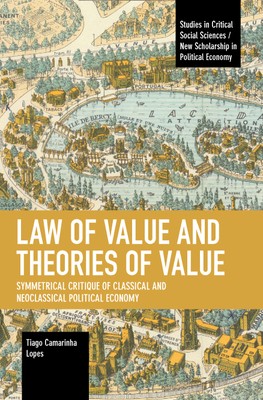
- We will send in 10–14 business days.
- Author: Tiago Camarinha Lopes
- Publisher: Haymarket Books
- ISBN-10: 1642598143
- ISBN-13: 9781642598148
- Format: 15 x 22.6 x 1.3 cm, minkšti viršeliai
- Language: English
- SAVE -10% with code: EXTRA
Reviews
Description
In Law of Value and Theories of Value, Tiago Camarinha Lopes presents the genesis of Karl Marx's understanding of the law of value by showing that the labor theory of value of utopian socialists and the utility theory of value of the Marginalist Revolution are subject to equal criticism by Marx's Critique of Political Economy.
Following Marx's distinction between classical and vulgar political economy, Camarinha explains the difference between a reactionary and a progressive strand in the world of non-Marxian economics. Commonly portrayed as a dated work targeting the general framework of economic thought of the 19th century, Das Kapital appears here as the blueprint for the ongoing construction of economic science of the working class in any period of History.
EXTRA 10 % discount with code: EXTRA
The promotion ends in 23d.00:39:05
The discount code is valid when purchasing from 10 €. Discounts do not stack.
- Author: Tiago Camarinha Lopes
- Publisher: Haymarket Books
- ISBN-10: 1642598143
- ISBN-13: 9781642598148
- Format: 15 x 22.6 x 1.3 cm, minkšti viršeliai
- Language: English English
In Law of Value and Theories of Value, Tiago Camarinha Lopes presents the genesis of Karl Marx's understanding of the law of value by showing that the labor theory of value of utopian socialists and the utility theory of value of the Marginalist Revolution are subject to equal criticism by Marx's Critique of Political Economy.
Following Marx's distinction between classical and vulgar political economy, Camarinha explains the difference between a reactionary and a progressive strand in the world of non-Marxian economics. Commonly portrayed as a dated work targeting the general framework of economic thought of the 19th century, Das Kapital appears here as the blueprint for the ongoing construction of economic science of the working class in any period of History.


Reviews